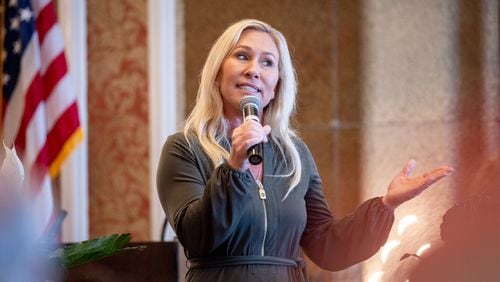Dr. Arnita Avery-Kelly has an active license to practice podiatry in Georgia, even though she is facing federal criminal charges that she handed out addictive opioids to patients who didn't need them.
Medical doctors are often forced to stop practicing – at least temporarily – if they are facing serious criminal charges that involve patients.
But the Georgia State Board of Podiatry Examiners still lists Avery-Kelly's license as active – with no concerns noted on her public profile. The board is in charge of licensing and regulating podiatrists, with a mission to “protect, promote and preserve the public health, safety and welfare of the citizens of Georgia.”
Board members said they usually wait to see how a case plays out before taking any action against a podiatrist’s license, even in a case as serious as the one against Avery-Kelly.
“We wait and see what the courts do,” said Dr. William Barry Turner, a podiatrist on Georgia’s four-member podiatry licensing board. “Once the court makes a ruling, then we have more discussions.”
Turner said he couldn’t comment on the Avery-Kelly matter specifically.
Dr. Leonard LaRussa, the board’s chairman, agreed that the board generally considers taking action if a licensed podiatrist is convicted of a crime, not just charged.
The attorney representing Avery-Kelly declined to comment on the case. It’s unclear whether she is still practicing in any capacity.
The Georgia Secretary of State’s office, which oversees most state licensing boards, would say only that “there is an open investigation into this matter.”
In one nine-month period, federal investigators found, the Atlanta foot doctor prescribed more than 116,000 oxycodone pills, according to the charges.
The federal case against Avery-Kelly includes a charge that she maintained podiatry clinics in Lithonia and Sandy Springs for the purpose of illegally distributing drugs.
Podiatrists are limited to diagnosing and treating diseases, ailments and conditions of the foot and leg. But in Georgia, their scope of practice covers everything from treating toenail issues to performing surgery. They can get a license to prescribe the same powerful drugs that medical doctors and osteopaths can order.
Avery-Kelly was under investigation for nearly three years before she was charged. The case went public after federal agents from the Drug Enforcement Administration raided her office in April.
After federal agents executed the search warrant, Avery-Kelly voluntarily surrendered her DEA registration that permitted her to prescribe controlled substances, according to a Department of Justice news release.
Court records show the conditions of her release prohibit her from having employees or partners that prescribe controlled substances.
It’s rare for the state’s podiatry board to take disciplinary actions. A listing of public disciplinary orders on its website shows only four actions since 2012.
However, the Georgia Secretary of State’s office said four public orders and one private order were issued by the board in 2016.
“Unfortunately, the disciplinary action website is not current due to site maintenance,” said Candice L. Broce, press secretary for Georgia Secretary of State Brian Kemp.
Broce provided the AJC with copies of all recent public actions.
“Under Georgia law, I cannot turn over the private order,” Broce said.
An Atlanta Journal-Constitution review of the four most recent public actions taken by the board found the following actions: one action against a podiatrist who failed to meet continuing education requirements, two cases lifting previous restrictions and one order granting a rule variance request.
The board did discipline a podiatrist over quality of care in 2012 in a case that involved improper prescribing, the AJC found.
LaRussa said the number of complaints against podiatrists is relatively small in Georgia. “For the most part,” he said, “everybody cares and wants to do the right thing.”
Board members said they do use private orders when they feel it’s appropriate.
“To do a public order, it needs to be something major,” Turner said.
As of this week, there were 532 podiatrists with active Georgia licenses, according to the Secretary of State’s website.
In the federal criminal case, Avery-Kelly was charged along with her office manager, Brenda Lewis.
The case began after the Georgia Drugs and Narcotics Agency met with Avery-Kelly in November 2013 and February 2014 “to discuss high volume, high dosage prescriptions she had written for opioids,” according to a summary of the case released by the U.S. Attorney for the Northern District of Georgia.
It’s unclear whether the podiatry board was made aware of the concerns about the prescribing issues.
The federal charges accuse Avery-Kelly of continuing to prescribe large volumes of drugs without a medical need and beyond the limits placed on the practice of podiatry. The drugs involved include oxycodone, hydromorphone, fentanyl, hydrocodone, phentermine, alprazolam, and promethazine with codeine, according to the U.S. Attorney’s office.
“It is sad commentary when persons in the medical community abuse their positions of trust to hide behind the veil of legitimacy to commit criminal acts,” said Daniel R. Salter, the Special Agent in Charge of the DEA Atlanta Field Division, in a press release about the federal charges. “The reckless distribution of pharmaceuticals results in addiction and death.”







